20th Edition of the Israeli Democracy Index
The Index finds that over past decade: significant decrease in the rate of optimists regarding the future of the country and a decline in public trust in state institutions | Among Jewish Israelis: 85% Place Trust the IDF | Only 8.5% Trust Political Parties

Photo by: Michal Fatal
Yohanan Plesner, President of the Israel Democracy Institute, and Prof. Tamar Hermann, Director of IDI's Viterbi Family Center for Public Opinion and Policy Research, presented President Isaac Herzog with the Israeli Democracy Index for 2022 today (Sunday). The Democracy Index, IDI’s annual flagship publication celebrating its twentieth anniversary, reveals a complex picture regarding the level of public trust in key institutions and officials, confidence in the country's civil service and the overall strength of Israeli democracy.
For the past twenty years the Israeli Democracy Index has striven to fulfill its raison d’être – “to evaluate the quality and functioning of Israeli democracy by collecting quantitative comparative data that are as comprehensive, precise, clear, reliable, and valid as possible.” This year’s Index continues to build on this legacy by promoting informed, in-depth public discourse about the state of Israeli democracy and thus contribute to bolstering it.
Twenty years of Democracy Index reports show that the opinions of the Israeli public are shaped in large part by several key variables: among Jews, political orientation (Right, Center, Left) and religiosity (Haredi, national religious, traditional religious, traditional non-religious, secular); and among Arabs, religion (Muslim, Christian, Druze) and voting pattern in national elections (for Zionist or non-Zionist parties).
President Isaac Herzog: "From the moment I was elected President, I have made the disputes and rifts within Israel society one of my most urgent priorities. I am therefore deeply worried about three points in the report presented to me today: the erosion of solidarity in Israel, the weakening of the sense of belonging to the country, and the decline in optimism about our condition. These are unpleasant figures, which come on top of other sections of the report that reflect the internal tensions within us. In other words, our cohesion is being weakened, and we must do everything to rebuild it.
"I believe that the right way starts with responsibility. The responsibility of each and every citizen, and even more so, our responsibility as elected officials. I intend to continue working and devoting my best efforts to this issue. Solidarity and a sense of belonging are critical for our resilience, and we must work hard to reinforce and strengthen them, day by day, hour by hour."
Yohanan Plesner, President of the Israel Democracy Institute: “The data in the Israeli Voice Index is clear: there is no majority for initiatives that that seek to weaken the Supreme Court and diminish the judiciary. The legislative package advanced by the Justice Minister will lead to a judiciary controlled by the executive branch, decimate the separation of powers in our democracy, and prevent the Supreme Court from defending the rights of individual citizens. Israeli from all walks of life should speak out against these one-sided reforms.
What is needed now are leaders from across the political spectrum who can come together and seek reforms that can lead to a constitutional compromise based on the counsel of leading experts and a broad consensus among Israelis. Such a compromise would instill stability in our political system, lessen the polarization in our society, and strengthen Israel’s democratic institutions and values.”
Prof. Tamar Hermann, Director of the Viterbi Family Center for Public Opinion and Policy Research at the Israel Democracy Institute: “The 2022 Israeli Democracy Index—our twentieth—not only reports this year’s data, but focuses on a longitudinal analysis of topics that have been examined over the years. This allows us to showcase long-term trends of stability as well as change in Israeli society, and present decision-makers with the classic rhetorical question of ‘where we have come from, and where we find ourselves today?’
It is apparent from the 2022 Index that the increased fragmentation of the public's positions on policy has reached a point where it is no longer clear whether there remains a shared Israeli base on questions of principle, or even on practical questions regarding the country’s day-to-day conduct. Over the past two decades there has also been an erosion of public attitudes regarding basic principles of democracy, especially among Jewish Israelis, regarding civil equality. In addition, there has been a clear decline in the desire to seek a balance between Israel’s dual Jewish and democratic characteristics. With the exception of the secular public, among the majority of Jewish Israelis today there is a growing preference to put more of an emphasis on the country’s Jewish character.”
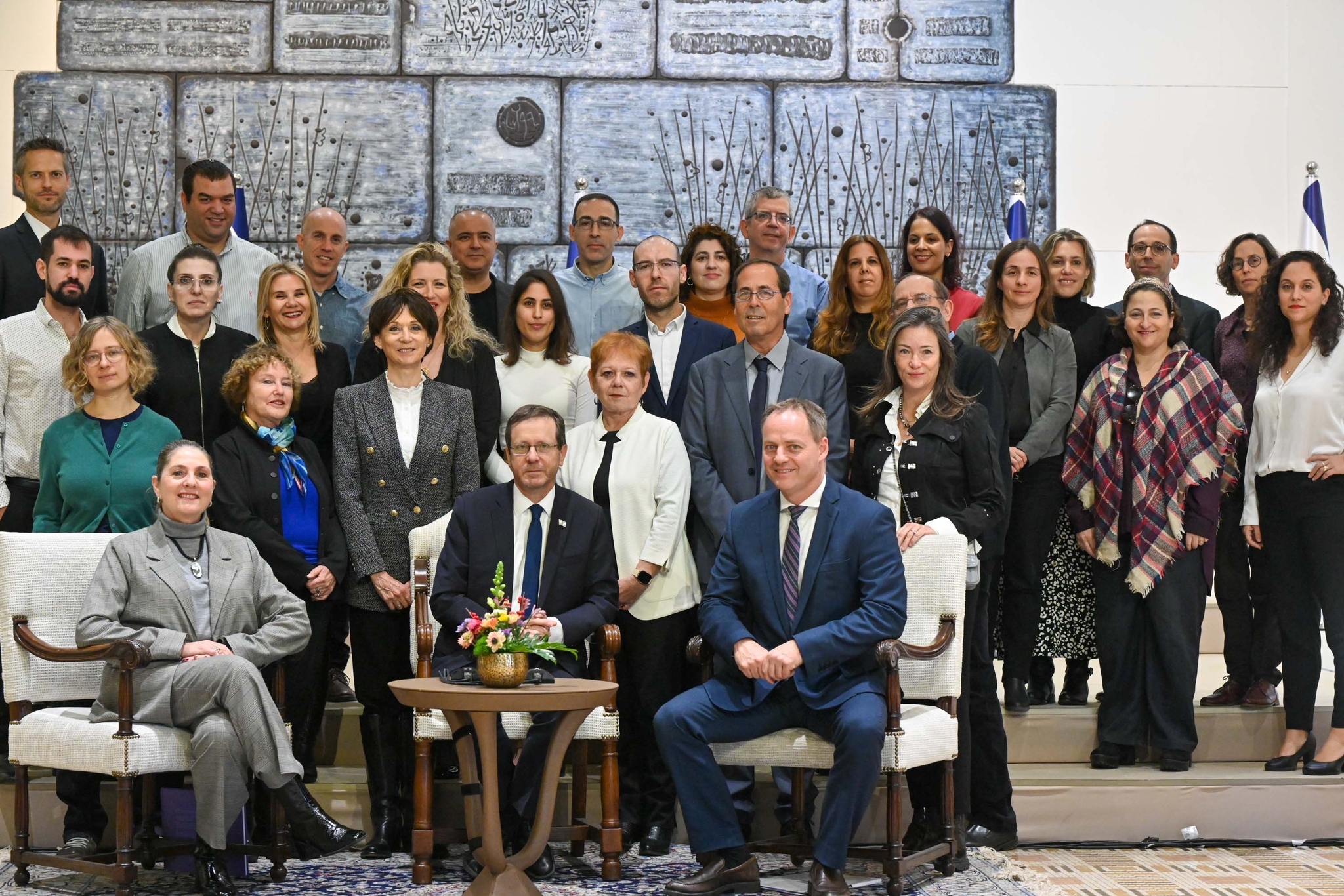
Photo by: Michal Fatal
Self-definition – Today 62% of Israeli Jews define themselves as being on the Right – segmentation by age reveals that: 73% ages 18-24, 75% ages 25-34, 62% ages 35-44, 53% ages 45-54, 52% ages 55-64 and 46% ages 65+, self-identify as being on the right. 24% percent define them selves as being in the Center and 11% on the Left.
There is a significant overlap between religiosity and political orientation. In all the religious groups a majority define themselves as being on the Right, with the exception of the secular group, which is divided fairly evenly between the three political camps.
Political orientation, multi-year averages, 2003-2022 (Jews, by religiosity, %)

Overall Situation – Since 2019 and until June 2022, there was a decline in the percentage of the total sample who define Israel’s overall situation as good or very good (25% - down from 53% in 2018) compared with an upturn in those who view it as “so-so” (42% up from 30% in 2018) or “very bad/bad (30% up from 16% in 2018).” However, in October 2022 the data reveal a drop in the percentage of respondents assessing the situation as bad (30%), and an increase in those assessing the situation as "so-so." (42%).
Optimistic about the future – 49% of Israelis are optimistic about Israel’s future – down from 76% in 2012. Multi-year averages show that the proportion of optimists in the Jewish public (67.6%) is much higher than in the Arab public (48%).
Sense of security – Israelis’ sense that the state is able to ensure their security has plummeted – down to 38% in 2022 (from 76% in 2020). The drop is particularly acute among the Right (30% in 2022 from 84% in 2020). Multi-year averages show that Israeli Arabs feel that their security is noticeably lower among Arabs (45.2%) than Jews (61.2%).
Sense of Belonging - Overall there has been some decline in the sense of belonging to the state and its problems (multi-year averages: 2003–2012, 83.9%; 2013–2022, 77.2%). More Jews feel part of the state than do Arabs (multi-year averages: 86.2% versus 48.7%, respectively).
The percentage presented in 2022, unless otherwise stated, refers to the average between the June and October surveys.
Among Jewish Israelis – when comparing multi-year averages of levels of trust Jewish Israelis have in state institutions, the two must trusted institutions are the IDF (88.1% multi-year, 85% 2022) and the President of Israel (66.9% multi-year, 62% 2022).The other state institutions rank as follows: the Supreme Court (59.5% multi-year, 42% 2022), the police (48% multi-year, 35% 2022), the government (37.5% multi-year, 24% 2022), the media (37.3% multi-year, 23% 2022), the Knesset (36.1% multi-year, 18.5% 2022) – and in last place the political parties (21.2% multi-year, 8.5% 2022).
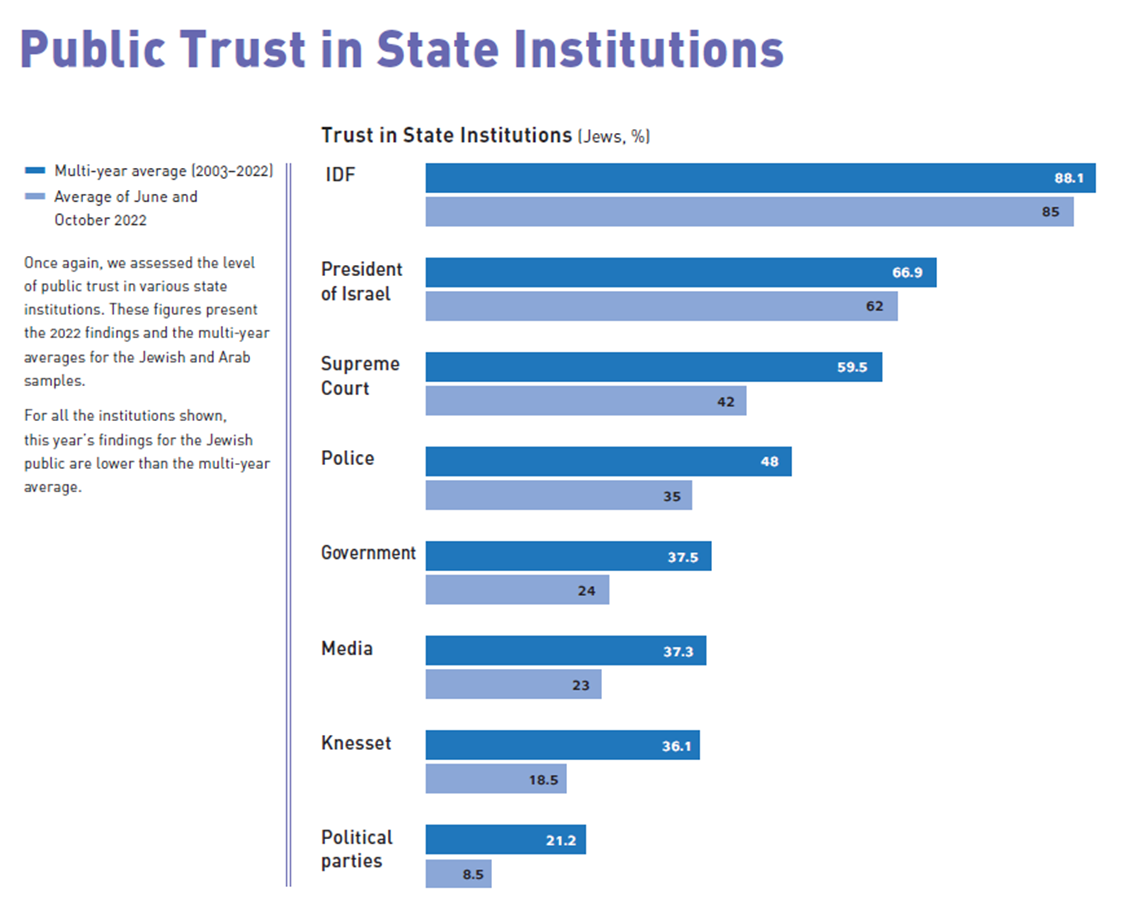
Among Arab Israelis – when comparing multi-year averages of levels of trust in all the state institutions has diminished. Trust in the President of Israel (36.3% multi-year, 29% 2022), the IDF (33.9% multi-year, 22% 2022), the Supreme Court (55.9% multi-year, 39% 2022), the police (37.5% multi-year, 17% 2022), the government (27.1% multi-year, 17% 2022), the media (40.3% multi-year, 19% 2022), the Knesset (32.3% multi-year, 14% 2022) – and in last place the political parties (24 multi-year, 10% 2022).
In October 2022 the trust in the new President of Israel increased to 66% among Jews (June- 58%) and 41% among Arabs (Arabs- 17%).
In the past decade average trust in all eight of the measured insittutions has dropped dramatically to 33% - down from 61% in 2012.
Yearly average levels of trust in all the institutions as a whole, compared with overall multi-year average (47.8% less than half) (trust quite a lot or very much; total sample; %)
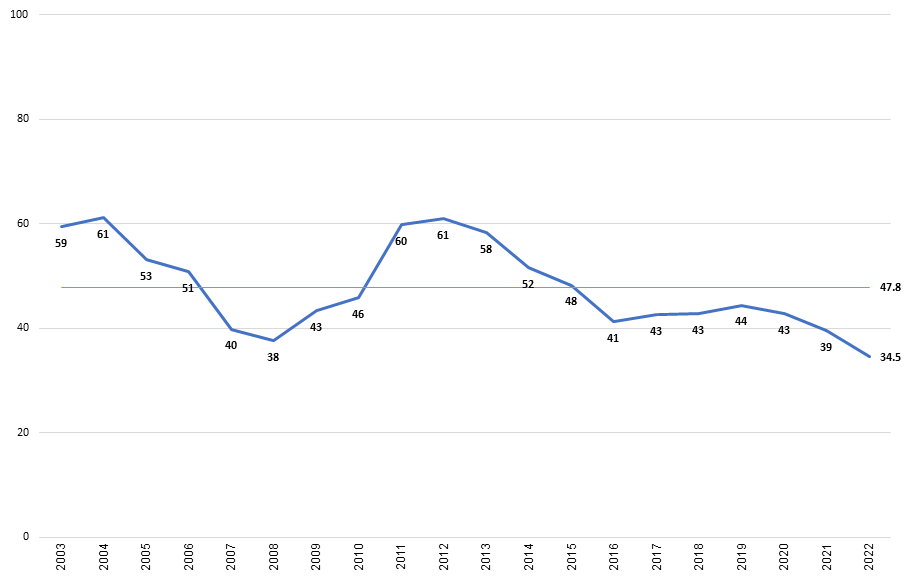
Human Rights Organizations – 66% of Israeli Jews think that human rights organizations cause damage to the state – among Israeli Arabs only a minority share this view (35%). Segmentation by political camps reflects a high variance between groups – 80% on the Right, 57% in the Center and only 17% on the Left agree.
Privileges – Around half (49%) of Jewish Israelis agree that “Jewish citizens of Israel should have more rights than non-Jewish citizens” (up from 27% in 2018). Segmentation by political camps here as well reflects a high variance between groups – 62% on the Right, 35.5% in the Center and only 11% on the Left agree.
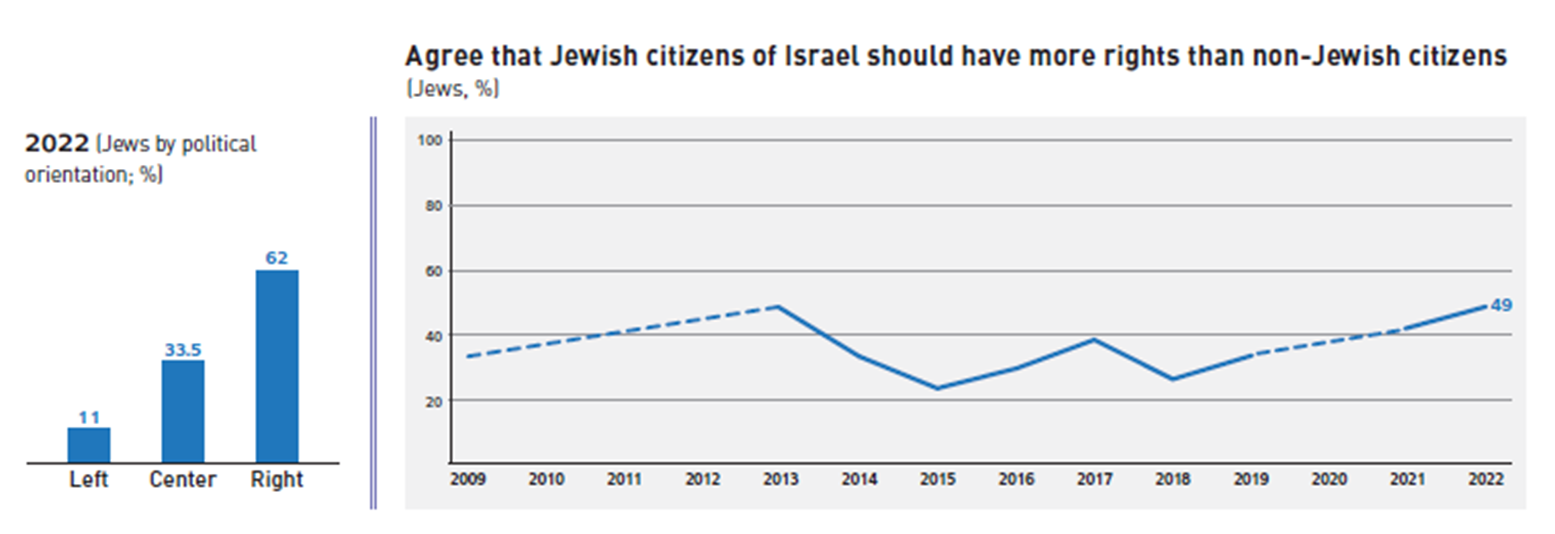
Important Decisions – multi-year average (2003-2022) shows that the majority of Jewish Israelis (74.9%; 2022- 80%) think that decisions crucial to peace and security and 59% (2022- 60%) in matters of economy and society - should be made by a Jewish majority.
Agree that decisions crucial to the state on issues of peace and security and on issues of economy and society should be made by a Jewish majority (Jews, %)
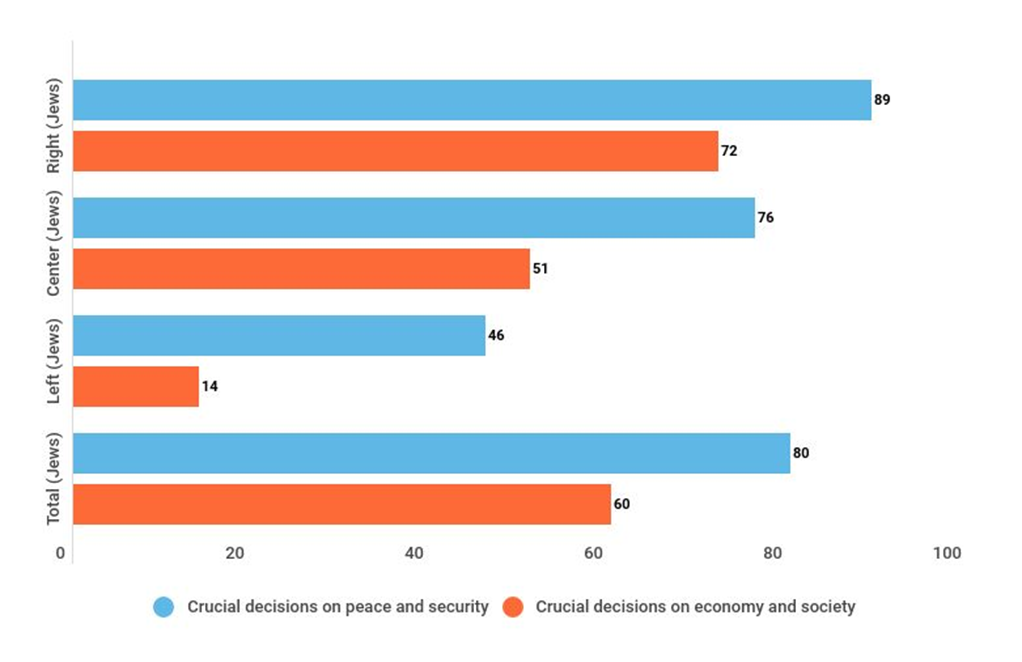
In 2022 a diminishing percentage of Israeli Jews (18% - down from 28% in 2019) think that there is a good balance between the Jewish and democratic elements – 38% think that the Jewish element is too strong (down from 47% in 2019) and 25% (up from 18% in 2019) say that the democratic elements are too strong. Almost one fifth (19%) say they don’t know.
When asked which component should be the dominant one – among Jews 43% said the Jewish element, 30% both elements equally and only 26% the democratic element.
Jews and Arabs – Over time the strongest source of tensions in Israeli society was between Jews and Arabs. Between 2018-2020 the highest recorded tensions were between Right and Left camps. Since the summer of 2021 – the strongest tension is once again between Jews and Arabs and to date 45% agree that this is the strongest tension in Israeli society. Multi-year averages reveals that the highest tensions were between - Jew and Arabs – 42.8%, Right and Left 27.7%, Religious and Secular 14.3%, rich and poor 7.5% and Ashkenazim and Mizrahim 2.8%.
Among both Jews and Arabs there has been a steep rise between 2018 and 2022 in the share who characterize relations between the two groups as bad or very bad – Jews from 27% to 60%; Arabs from 26% to 45%.
Discrimination – A multi-year average shows that a majority (78.4%) of the Arab public feel that Arabs are discriminated against in Israel, whereas only 49.1% (multi-year average) of Jewish Israelis think likewise. Among the Jewish population there is high variance in the political segmentation – 82% among the Left, 48% among the Center and only 16% among the Right agree.
Politicians’ Motivation – multi-year average shows that Jewish and Arab Israelis agree that politicians are more concerned with their own interests than with those of the public that elected them (79.3% and 73.1% respectively).
Supreme Court - There is a continuing decline in public trust in the Supreme Court. Segmentation by political affiliation (October 2022) reveals that 80% among the Left, 62% among the Center and only 29% among the Right trust the Supreme Court.
Repeal of laws by the Supreme Court - in 5 measurements, over more than a decade, an average majority of 55.6% among Israelis, support the Supreme Court having the authority to rescind laws passed by the Knesset, if they are found to be contrary to the principles of democracy. Among Arabs, the support for this is much higher than among Jews (87% compared to 51%). Segmentation among Jews according to political camps showed a majority of supporters on the left and center (89% and 70%) compared to a minority on the right (37.5%).
In 2022 A majority (56% among Jews and 71% among Arabs) agrees the Supreme Court should have the power to overturn laws passed by the Knesset if they are found to contradict democratic principles.
Agree that the Supreme Court should have the power to overturn laws passed by the Knesset, if the are found to contradict democratic principles (Total sample, %)

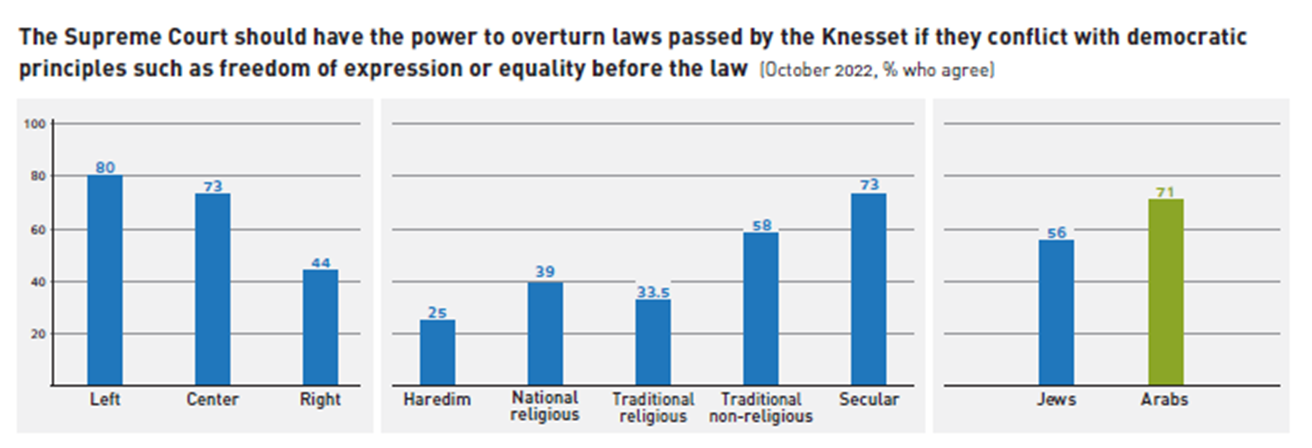
Comparing Israel’s scores for 2021 with its multi-year averages over the last two decades (2003–2020) yields a relatively balanced picture. In five indicators, Israel scored higher in 2021 than the multi-year average, and the two most substantial increases were found in political participation (with an impressive surge of 15.9%) and participatory democracy (with an upturn of 4.8%).
The highest ranking was in the Economist Intelligence Unit’s political participation indicator (2021 100; multi-year average 87.3) and Freedom House’s political rights indicator (2021, 85; multi-year average 89.9).
At the bottom of the list this year are the freedom of the press indicator compiled by Reporters Without Borders (2021, 59.6; multi-year average, 74.8), and Transparency International’s perception of corruption indicator (2021, 59; multi-year average, 61.3).
The 2022 Democracy Index was prepared by the Viterbi Family Center (formerly known as the Gutman Center) for Public Opinion and Policy Research of the Israel Democracy Institute.
In the survey, which was conducted on the internet and by telephone (supplements of groups that are not sufficiently represented on the network) from May 22-June 21, 2022, 1,092 men and women were interviewed in Hebrew and 219 in Arabic, constituting a representative national sample of the entire adult population of Israel aged 18 and older. The maximum sampling error for the entire sample was 2.76%± at a confidence level of 95%.
The fieldwork in Hebrew was done by CI Market Research and in Arabic by Afkar Research and Knowledge For the full data file see: https://dataisrael.idi.org.il
Some of the survey questions were asked again at the end of October 2022 by the Midgam Institute.
In total, during the twenty years of the Democracy Index’s existence 23,356 Israelis were interviewed (19,614 Jews and 3,742 Arabs).
